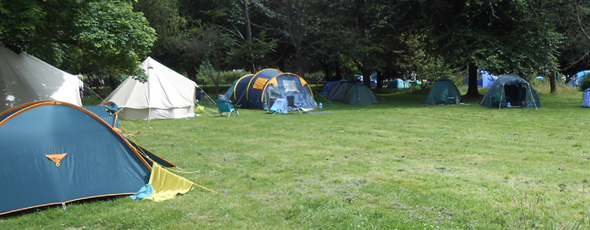
Occupiers organised assemblies and discussions, music jams and poetry slams, talks, workshops, films and livestreaming at The Green Gathering, a small festival held near Chepstow in early August.
The Green Gathering’s Occupy camp consisted of an Info Tent and archive gallery housed in a bespoke geodesic dome, freshly-painted ‘Occupy’ and ‘Capitalism is Crisis’ banners, and a campfire discussion space. Occupiers involved in a number of working groups were present, including Process, Economics, Energy, Equity and Environment, The Occupied Times, Press and Occupii.org.
Three occupiers spoke and debated in the Green Forum on “What is Occupy – past, present and future?” Iain Findlay hosted a workshop on sustainability, and climate activist and poet Danny Chivers gave an engaging account of his arrest for “thought crime” and the subsequent unravelling of the case against the Ratcliffe-on-Soar protesters due to the nefarious activities of an infamous undercover cop. A film screening tying together various aspects of the Occupy movement was drawn from YouTube footage, Polly Tikkle Productions, a Russian TV interview and an agitprop animation.
Occupied Times editor Ragnhild Freng Dale said of her time at the Gathering: “What surprised me, in a world where the corporate media has mostly forgotten about the Occupy movement, was that so many people knew and felt positive about Occupy. They felt the Occupy name is widely recognised and has resonance, that it should be retained and utilised even if people are increasingly associating themselves with a diversity of campaigns, actions and groups. I discovered in others, and through them in myself, a thread of hope tied to Occupy which can be cherished and built upon.”
Tim Flitcroft of Occupy London’s Economics Working Group said “The visitors to the Occupy camp were largely sympathetic and their criticisms and questions were useful and informative. Many identified with radical, alternative or green organisations, meaning that the interaction would likely go beyond the individual and towards the growing of a networked community. This is the benefit of being at this type of festival, we were finding and forming links with like-minded people and groups as well as outreaching to those who, living in the countryside rather than in cities, have only a hazy understanding of what Occupy was and is about.”
The main question people asked was “what can replace the current system?” Workshops on squatting and co-operatives, renewable energy, permaculture, transition and traditional crafts, made it feel as though this Gathering created a space for exploration of some real life alternatives. Occupy helped to tie these alternatives together and relate them to a bigger, global picture.
An assembly on the theme “what are festivals for?” elicited a patchwork of responses: “They are about sharing skills and experiences, about seeing all the incredible things people are already doing and have been doing for years, and gaining hope and inspiration from that”, and “They are about building networks. We need to organise and build the alternatives we are talking about in our local communities. But we also need wider networks to get new ideas and support, and to organise against a government that will attack us sooner or later.”
There was debate about the degree to which festivals have been commodified and corporatised. The feeling was that smaller, less commercial festivals are better; that they have a basis in personal responsibility, in creating something together, rather than having a passive, hedonistic experience ‘laid-on’. Latitude, which hosted an Occupy camp in July, was sponsored by Vodafone. It is by no means the most crass of today’s festivals, but for many it and similar events have lost their soul. The Festival of Resistance, which also had an Occupy presence, is at the other extreme, with very little in the way of entertainment, being less of a festival and more of an educational activist-moot. The Green Gathering lies between these poles, and is seen by many in alternative communities as a ‘Gathering of the Tribes’, although less so than pre-2007, when it attracted 20,000 like-minded souls and was described as an entire alternative city. According to those involved in organising the gathering back then, the powers-that-be were “afraid, very afraid”. They closed the festival down, bankrupting it in the process. Resilient, it has sprung back, but is now much smaller than in its heyday.
It sometimes feels as though an event such as this needs to last for more than four days to fulfil its potential, but occupiers learnt the hard way that temporary autonomous zones have a tendency to sap energy and engender disillusion if they attempt to put down roots and become permanent. In a true TAZ, every moment is precious.
By Emma Fordham









